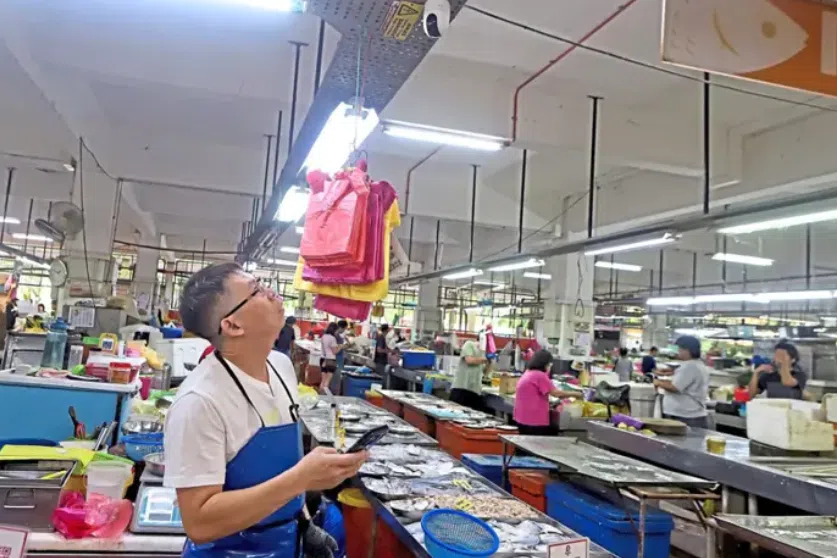Wet market traders in Malaysia put up CCTV cameras to deter thieves
Sign up now: Get insights on the biggest stories in Malaysia

A fishmonger looking at the CCTV he installed at his stall at the Batu Lanchang market in George Town, Penang, Malaysia.
PHOTO: THE STAR/ASIA NEWS NETWORK
PETALING JAYA – Years of frequent thefts at the Kuala Lumpur Wholesale Market in the Selayang area of Selangor have pushed seafood and vegetable traders to take matters into their own hands by installing hundreds of CCTV cameras to keep watch over their stalls.
Mr Sing Kian Hock, president of Hoi Seong Fish Wholesalers Association, said Kuala Lumpur City Hall (DBKL) first installed 122 CCTV cameras at the market in 2017 following repeated complaints from traders about goods being stolen.
“We requested this because there were too many thefts,” he said when contacted.
“Before that, we hired our own security guards to patrol the market from 6pm to 2am. Each seafood stall contributed around RM80 (S$25) a month.”
He said seafood stalls were often targeted because the value of their products was higher.
“After we installed CCTV cameras, everything changed. The entire area was monitored, and the theft problem was contained,” he said.
Mr Wong Keng Fatt, president of the Kuala Lumpur Vegetable Wholesalers Association, said almost every vegetable stall now has its own CCTV camera.
“DBKL has installed cameras around the outer areas of the market, but they don’t cover every corner or the individual stalls. So our association decided to install our own cameras,” he said.
He added that the system had proven effective in catching would-be thieves, who were usually workers and those familiar with the market.
“They knew which vegetables were more expensive. It usually happened during unloading – a thief would push away a trolley of goods and disappear,” he said. “Once they saw cameras everywhere, they didn’t dare steal again.”
Mr Wong recalled that the association had started installing CCTV cameras about 20 years ago, at a time when the technology was costly.
“We spent around RM200,000 then to install about 120 cameras. There are 216 vegetable stalls, so each camera covers two to three stalls,” he said.
Meanwhile, Malaysian Fish Industries General Association secretary Natasha Bok Chia Bee said seafood traders in Penang also took similar precautions.
“I haven’t had any theft cases so far because I always have my own staff overseeing the unloading, especially at night. Otherwise, things can go missing,” she said.
She added that although the Penang Island City Council had installed CCTV cameras around the market, many traders preferred to have their own systems for easier access.
“Some of the council cameras don’t capture everything, and if we want to review footage, we need to go to the office and wait for an officer. It’s faster and safer to have our own cameras,” she said.
“Of course, it costs more – we need Wi-Fi, about RM100 to RM200 a month – but that’s still cheaper than losing our seafood. We’d rather spend a little more for peace of mind.”
Meanwhile, checks at three wet markets managed by the Petaling Jaya City Council, all of which have CCTVs installed, showed that over the past several years, traders had not faced losses from the theft of goods stored at their stalls after closing time.
At the Section 14 wet market in Petaling Jaya, vegetable seller T. Raja, who has been operating his stall for 40 years, said about 10 years ago, thieves had stolen baskets of greens from his stall, but there had been no cases over the past five years.
Fishmonger Yee Weng Onn, who has been operating his stall for 50 years, said that previously there were people who stole a bucket or two of fish, but such cases no longer happened.
The situation is similar at the Sungai Way wet market on Jalan SS9a/1.
Ms Sandra Lee, who runs a sundry shop, said cases of theft at the market were a thing of the past and rarely occur nowadays.
“Many years ago, there were cases of cooking gas cylinders going missing from the food stalls next door, and at times eggs and other items also got stolen, but this no longer happens,” she said.
Butcher C. Shankar and vegetable seller Iswan Iskandar Abd Rashid echoed Ms Lee’s comments.
“Perhaps the CCTVs here help (to) deter the thieves,” said Mr Shankar, who sells mutton.
As for traders at the PJ Old Town wet market in Jalan Othman, having the entrances to the market gated has helped eradicate theft.
Mr Kamal Hashim, who sells raw keropok lekor and various noodles, said the gates at the market are closed at 6pm and security guards keep watch over the premises.
“The gates are opened only at 3am when traders start opening their businesses. Nobody is allowed entry between 6pm and 3am, including traders of the market,” he said. “Several years ago, a few of us did suffer small losses from theft, but that is rare nowadays,” he added.
Mr Ah Hah, a vegetable seller who has been at the market for 50 years, also credited the fencing and the stationing of security guards for the crime-free outcome. THE STAR/ASIA NEWS NETWORK


